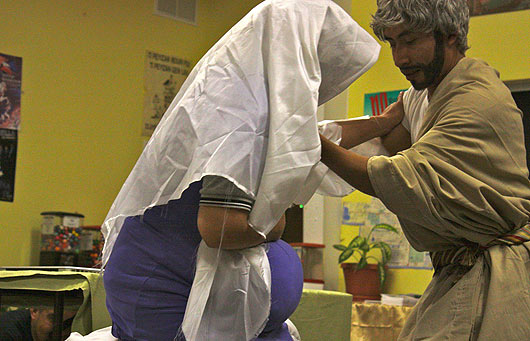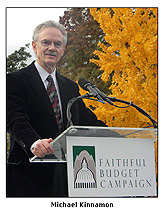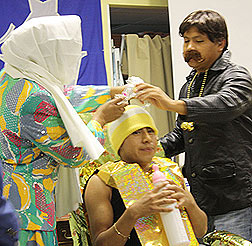 |
|
CIW members act out the Nativity scene at this past Wednesday’s community meeting in Immokalee. The re-enactment is an annual event, designed in the tradition of popular theater to provoke reflection on the meaning of Christ’s birth into poverty.
|
Today we received an email entitled “Reflections from Rev. Dr. Michael Kinnamon on Why Christians Should Be Particularly Aware of Poverty and Justice Issues at Christmastime.” It included the text of his comments from earlier this month at the Faithful Budget Prayer Vigil on Capitol Hill. We want to begin this post today by sharing an extended excerpt of his comments:
|
What Christians confess and celebrate in this season is that “God [the Word] became flesh and lived among us” (John 1:14). The implications of this are so staggering that I fear we, Christians, often miss them. If we look for God only in spiritual things, if we speak about God’s presence as something that is only in our hearts, if we teach that God’s promise has only to do with heaven, then we may overlook God altogether. Because the God we know and worship was born in a cave where animals were kept—the child of poor, Jewish peasants—threatened by a king who saw in him the seed of political revolution (Luke 2:1-20; Matthew 2:1-18). “Christmas,” writes theologian Shirley Guthrie, “is the story of the radical invasion of God into the kind of real world where we live all year long—a world where there is political unrest and injustice, poverty, hatred, jealousy, and both the fear and longing that things could be different.”… … That’s why a religion that celebrates incarnation cannot remain aloof from political oppression or economic injustice or environmental destruction. God, Christians believe, became flesh, the ultimate act of solidarity with this world in all its political, economic, and ecological messiness. And that’s why the church, as the primary instrument of God’s purpose for Christians, is called to promote social transformation toward the day when God’s will for abundant life is realized on earth as it is in heaven. Theologically speaking, re-enactments of the Nativity should not take place inside our sanctuaries, but outside the doors of the church, in the midst of the everyday world where “the fullness of God was pleased to dwell” (Colossians 1:19). To put it simply and bluntly: A church that is indifferent to worldly struggles, indifferent to the plight of the poor, is following its own agenda, not God’s.” |
The idea of the Nativity re-enactment taking place “outside the doors of the church, in the midst of the everyday world,” is something CIW members have been doing for years in Immokalee, and the message of the theater is decidedly one of social transformation.
This year was no different, and we thought we’d share with you another email — this one written by an intern working in Immokalee to her grandmother to convey her thoughts after watching the theater and the reflection that followed — as a way to, in a small measure, share the Immokalee Christmas experience with you during this very special time of year:
|
Tonight the Coalition staff acted out the story of Jesus’ birth—except Version 1 of the story (right) birthed Jesus into a rich family (father in leather jacket, fake mustache, toupee, silver staff, hilarious. Baby Jesus wearing gold wrapping paper and being rolled around in a roll-y chair full of sparkles. Mother Mary dressed in sequins. Lots of laughter). Version 2 (picture at top of post) was more accurate: A pregnant Mary, draped in lackluster garments, rides a donkey—who is just another worker costumed in sheets “back stage” (aka around the corner). Baby Jesus was another worker wearing a white sheet wrapped like a diaper, released from beneath a low lit table. After all the laughter subsided, two seasoned organizers, Lucas and Gerardo, started asking the 50-person audience questions: Did Jesus come from a rich family, or a poor one? Would Jesus have been so prophetic if he’d been rich? What noble journey did he embark on? What noble journey are we on, sacrificing for our families far away to support them? If Jesus had been born in this country, where would’ve he been born: Naples or Immokalee? Is Jesus born again every Christmas? Or is he born again in our hearts, renewing our hope to continue our struggle? Why is our faith important? And what is faith without action? Is God going to answer to our plight? Or will he only do so once we are doing for ourselves?” |
Each year Christians around the world retell the story of their Savior’s birth, how a poor, rural family was forced to travel to Bethlehem so the Emperor could count them. And there, far from home, Mary gave birth to a son and laid him in a manger because there was no room for them in the inn.
May this good news bring us all hope, courage and joy this holiday season.

 “I realize that we are an interfaith campaign, but I thought it might be appropriate if I said a brief word about the Christian holiday of Christmas, and why I believe it compels Christians to be here for this vigil.
“I realize that we are an interfaith campaign, but I thought it might be appropriate if I said a brief word about the Christian holiday of Christmas, and why I believe it compels Christians to be here for this vigil. “I just came back from a weekly workers meeting, one of the richest parts about being here. It’s “popular education” in action: no theory, no lofty words, just humans doing human things that make sense to any person.
“I just came back from a weekly workers meeting, one of the richest parts about being here. It’s “popular education” in action: no theory, no lofty words, just humans doing human things that make sense to any person.